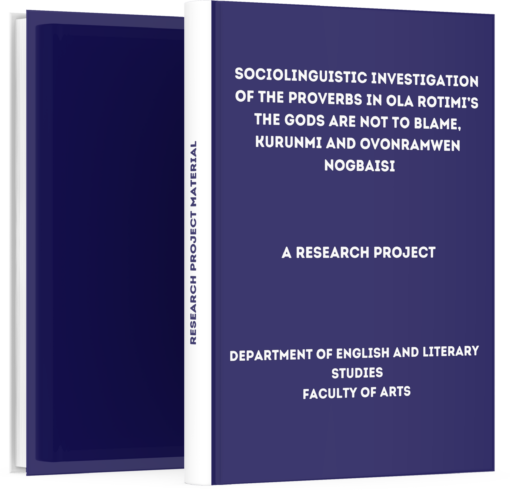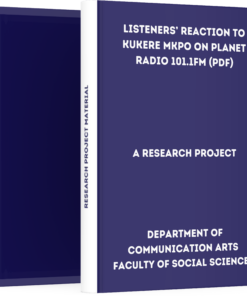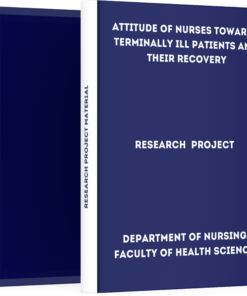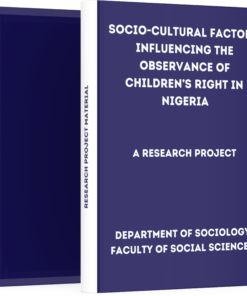Sociolinguistic Investigation of the Proverbs in Ola Rotimi’s The Gods Are Not To Blame, Kurunmi and Ovonramwen Nogbaisi
₦3,000.00
If you are interested in getting this project material “Sociolinguistic Investigation of the Proverbs in Ola Rotimi’s The Gods Are Not To Blame, Kurunmi and Ovonramwen Nogbaisi”, click on the DOWNLOAD BUTTON to make payment and the file will be delivered to your email immediately after confirmation.
Description
Download Sociolinguistic Investigation of the Proverbs in Ola Rotimi’s The Gods Are Not To Blame, Kurunmi and Ovonramwen Nogbaisi. English and Literary Studies students who are writing their projects can get this material to aid their research work.
Abstract
The English language is a living and dynamic language and because of this, it is flexible and open to changes that occur everywhere it is used. This is exactly the case with English in Nigeria. The socio-cultural setting and the values of the Nigerian people have influenced the use of English language in the country.
Many researchers have noted that proverbs form a formidable part of both the spoken and written discourse in the English-speaking world, especially Nigeria where English is used as a very important second language.
This explains why this study focuses on the Sociolinguistics of the Proverbs in Ola Rotimi’s The Gods Are Not to Blame, Kurunmi and Ovonramwen Nogbaisi.
In the Yoruba Speech Community of Nigeria to which Ola Rotimi belongs, proverbs are considered as multifunctional and flexible instruments of language. They are employed for social relationships, for performing routine activities and for reflecting awareness of the environment.
Introduction
Proverbs are used by people from all parts of the world for the transmission of their wisdom, knowledge, experiences and feelings. As Carter puts it, “every language has its thesaurus of proverbs” (63). This, in turn, has made proverbs to become current and innovative.
In every speech community proverbs are used to achieve certain purposes or objectives. In the words of Fanany Rebecca and Ismet, “Proverbs in many societies are used to offer advice, resolve problems between individuals, and indicate comradery and goodwill” (122).
English proverbs may be seen as closely related to English folk wisdom even though many of them have literary origin.
In Africa, proverbs are of immense importance to the people. This explains why African proverbs have origin or background and explanation that are rooted in the socio-cultural life of the people.
How to Download this Project Material
First, note that we are one of the best and most reliable online platforms because we don’t retain any of your personal information or data as regards making payments online.
PRICE: ₦3,500 ₦3,000 (Three Thousand Naira Only)
Make a bank deposit or mobile transfer of ₦2,000 only to the account given below;
Bank Name: UBA Account Number: 1022564031 Account Name: TMLT PRO SERVICES
After making the payment, CLICK HERE to send the following on WhatsApp;
- Depositor’s Name or Screenshot of Payment
- Name of the Past Question
- Active Email Address
or Call Us On +2348082284439 Once your details have been received and your payment confirmed by us, you will receive the past question in your email or WhatsApp within 5 Minutes.
Guarantee of Getting the Material
We understand that due to the high rate of fraud, many people are afraid of making purchases online but be rest assured that PastExamQuestions will deliver your material after payment.
Once your details have been received and your payment confirmed by us, you will receive the past question in your email or WhatsApp.
Give us Feedback
Have we been able to satisfy you? How well do you think the material will be helpful after having gone through it? Does the price worth the material?
Let’s hear from you! We recommend that our customers give feedback at the end of every transaction to enable us to serve better. You can do this by clicking the review button on this page.
Where is the review button? >> Just scroll up to where you see reviews





Reviews
There are no reviews yet.